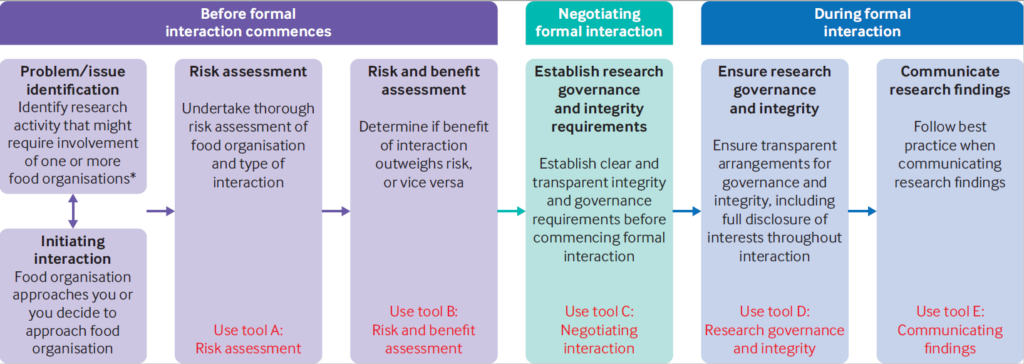Researchers engaging with the food industry can be subject to conflicts of interest and reputational risks. The Food Research RisK guidance and toolkit published in the BMJ can help researchers navigate this tricky territory, make informed decisions, and minimise adverse outcomes.
Quick links
- Avoiding conflicts of interest and reputational risks associated with population research on food and nutrition: the Food Research risK (FoRK) guidance and toolkit for researchers. Cullerton K, Adams J, Forouhi N, Francis O, White M. BMJ 2024. https://doi.org/10.1136/bmj-2023-077908
- FoRK Toolkit – Tools A-E
- FoRK Toolkit – Guidance for Use
- Toolkit feedback survey
The need for FoRK
Poor diet is adding to poor health globally, and the food industry is a key influencer of what we all eat. Achieving healthier diets requires actions by the commercial food sector, but evidence suggests that these actions are unlikely to happen without external pressure. And it is well documented that the food industry engages in practices to influence research and policy to the detriment of population health.
Nevertheless, research funders and institutions are increasingly encouraging researchers to work with the commercial food sector to identify solutions to problems in the food system. Because the goals of the commercial food sector and population health researchers are often not aligned, this can create challenges and controversy if the two groups engage in research together. This can lead to conflicts of interest, bias and distortion, and undermine trust in research and policy.
However, the commercial food sector is large and complex, encompassing everything from family businesses to global food corporations, from farmers to product manufacturers to shops and restaurants. This means that there are a range of possible outcomes that might come out of different interactions.
So how do researchers know if and when it is safe to engage? And how do they engage without creating mistrust or bias? Until recently there has been no internationally agreed guidance currently for population health researchers.
Researchers at the MRC Epidemiology Unit conducted a programme of research and international consensus building to develop clear guidance to help researchers navigate this terrain, assess opportunities to interact with the commercial food sector, and prevent and manage conflicts of interest. The work included a Systematic Review, an international two-stage Delphi study and survey, and an international consensus building workshop.
The result is the Food Research risK (FoRK) Guidance and Toolkit. It aims to support researchers in thinking about whether and how to interact with commercial food sector organisations at all stages of the research.
- Avoiding conflicts of interest and reputational risks associated with population research on food and nutrition: the Food Research risK (FoRK) guidance and toolkit for researchers. Cullerton K, Adams J, Forouhi N, Francis O, White M. BMJ 2024. https://doi.org/10.1136/bmj-2023-077908
- FoRK Toolkit – Tools A-E
- FoRK Toolkit – Guidance for Use
- More about the project
Using and improving FoRK
Researchers can use the FoRK Toolkit at all stages of the research process.

The goal is that research integrity is protected, useful research can be co-created, and health-promoting food policy can be supported.
The FoRK toolkit was designed for researchers working in population level nutritional epidemiology, public health nutrition, dietary public health, and food policy evaluation. The researchers acknowledge that the picture can be different for those working in different fields (for example in a clinical or laboratory settings), as well as those interacting with different industries.
Researchers are encouraged to use and reflect on the toolkit and to contribute to its continual improvement. It is also hoped that it could provide a template that can be adapted to guide interactions between other researchers and other commercial sectors, as well as non-commercial organisations.

 MRC Epidemiology Unit
MRC Epidemiology Unit